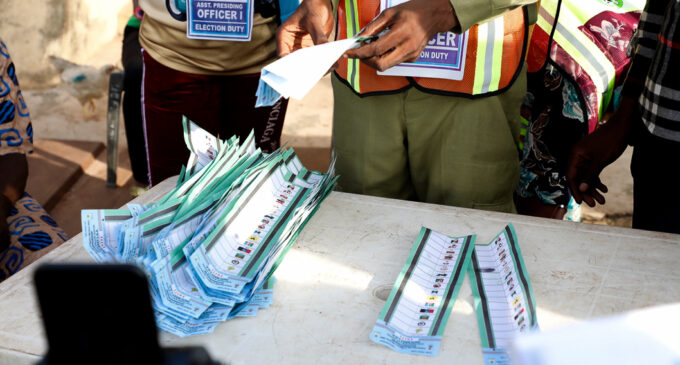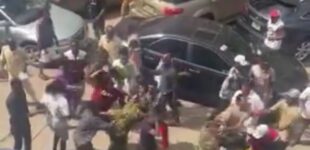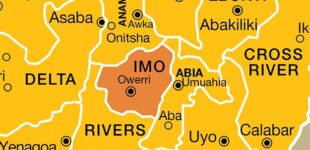Unfolding developments in Lagos governorship election petition

BY ADEOLUWA ADELAJA
The very recent judgements of National Assembly Tribunal sitting in Asaba and Kano, nullifying elections of House of Representative members of Aniocha/Oshimil Federal constituency of Delta State Hon. Okolie Ngozi of Labour Party and Umar Muktar Yerima of NNPP, representing Tarauni Federal Constituency of Kano state over name discrepancies on certificates submitted to INEC, and failure to comply with the provisions of the electoral act 2022 on conduct of primary election, has sent jitters down the spines of the ruling APC in Lagos state and Labour Party, as both grounds are contained in the petition submitted by the candidate of the PDP against the Labour Party and APC at the Lagos state governorship election petition tribunal.
Jandor/PDP in their joint final address to the tribunal, said the background fact of their petition are that governorship election in Lagos state held on 18 March, 2023 was organized and conducted by the 1st Respondent (INEC) under certain constitutional rules provided in the constitution of the Federal Republic of Nigeria, 1999 as amended and the Electoral Act, 2022.
Part of these rules was that candidates for the election must be members of the relevant political parties who must sponsor them for the election and the sponsorship includes holding valid primary elections and submitting valid and unfalsified documents.
Before the conduct of primary election, all political parties including the 4th and 6th Respondents (APC and Labour Party) must give the 1st Respondent (INEC) at least 21 days’ notice in compliance with the Electoral Act, 2022 and such notice must emanate from the National Executive Committee of the party to the 1st Respondent’s Chairman. This, the 4th and 6th Respondents failed to do.
Sadly too, the notices for the 4th and 6th Respondents party primaries were issued by the Lagos Chapter of the 4th and 6th Respondents contrary to the provisions of the Electoral Act, 2022 and at a time the 5th Respondent(GRV) was yet to resign his membership of the 2nd Petitioner (PDP).
It was also the requirement of the Electoral Act, 2022 that every political party sponsoring a candidate must submit Forms EC9 (also called Form CF001 in previous years) to the 1st Respondent where personal particulars and credentials of the candidates are verified under oath.
“Exhibits P16-P27, P28-P39, P10 and P71-P78 which were the respective Forms CF001 and EC9 of the 2nd, 3rd and 5th Respondents submitted to the 1st Respondent were null and void. Whilst the 2nd Respondent supplied false information in his from CF001 (Exhibit P28-P39) and Forms EC9 (Exhibit P10), the 3rd Respondent submitted an invalid Form EC9, Exhibits P16-P27, without the oath page to gain undue advantage. In the case of the 5th Respondent, his Oath page (Exhibit P77) was endorsed under oath on 14th July, 2022 before the substitution primary election that produced him.”
Through out the trial, the Respondents rather than defending the issues at hand, were fixated on their stance that the tribunal lacks jurisdiction to try the petition, Meanwhile by the provisions of section 134(1) (a) of the Electoral Act 2022, an election may be questioned on the grounds that “a person whose election is questioned was at the time of the election, not qualified to contest the election;”, moreso, evidence at the trial did not demonstrate that the tribunal lacks jurisdiction.
The entire submission of the 2nd, 3rd and 5th Respondents that the grounds of the Petition bother on pre-election matters, yet again, vindicate the Petitioners that all the Respondents have no defence to this Petition as latest ruling of National Assembly election petition tribunal sitting Asaba has laid to rest the fact that issue bothering on primary election is both pre and post election matter.
The said ruling is as follows: “On the issue that the notice of the primaries to INEC can only be raised by INEC and an aspirant in the affected political party as pre- election matter, it is the considered view of the Tribunal that having failed to conduct a primary election to produce and sponsor the 3rd Respondent which is based on the notice given to INEC, the cumulative effect is that it contravened section 65 of the Constitution and is therefore a post-election matter. Section 65(1) (b) of the 1999 Constitution as amended provides that Subject to the provisions of section 66 of this Constitution, a person shall be qualified for election as a member of the House of Representatives if he is a member of a political party and is sponsored by that party. Having come to the conclusion that there was no valid primary to elect the 3rd Respondent, he cannot be said to have been sponsored by the 2nd Respondent which is clearly in contravention of the above provision of the Constitution and it’s a post election matter. The effect of failure of political party to comply with the provisions of the Electoral Act in the conduct of primary election is that its candidate for election shall not be included in the election for the particular position in issue. See Section 84(13) of the Electoral Act, 2022 and the case of Kente v. Bwacha supra. Implicit in the provision is that such a primary election cannot produce a valid candidate for the election and is therefore a nullity. See the case of Yerima v. Balami (2023) 6NWLR(Pt. 3) 487. See also Ibrahim v. Lawal (2015) 1 NWLR (Pt. 1489) 490.
“Furthermore, it is settled law that in this country no one can contest an election without first and foremost being a member of a registered political party and, secondly, being sponsored by that party as a candidate for the election. See the cases of Gwede v. INEC and Ors (2014) LPELR – 23763S C pp 49 paras C, and Wambai v. Donatus and Ors (2014) LPELR-23303 SC pp 26-28 paras F. We are therefore in agreement with the submission of learned senior counsel for the Petitioners and decided cases that the qualification of a candidate is both pre and post- election matter that can be challenged either in the Federal or State High Court or the Tribunal. See the case of Fayemi v. Oni and Ors (2019)”
Contrary to the misleading submissions of the 2nd, 3rd and 5th Respondents (whose mere technical submissions without substance were long anticipated)in the instant case, the jurisdiction of this Tribunal to countenance the grounds of the Petition, is donated by Sections 177 and 182 of the Constitution of the Federal Republic of Nigeria, 1999 as amended.
The sponsorship and participation of the 2nd, 3rd and the 5th Respondents in the 18th March, 2023 Governorship Election in Lagos State violated the above provisions and our first focus is Section 177(c) of the above Constitution which specifically provides: “A person shall be qualifiedfor election to the office of Governor of a State if- (c) He is a member ofa political party and is sponsored by that Political Party”.
The provision, in its introduction, is concerned about the substantive election but the further qualifying factors of membership and sponsorship of the candidate by the Political Party in paragraph (c) thereof, must not be vitiated by any statutory vice, as the facts of this Petition have shown.
The 2nd, 3rd and 5th Respondents need to be reminded that election is a process, and not just one event.
In INEC v. Action Congress (2009) 2 NWLR (Pt. 1126) 524 at 588 paragraph D, the Court held: “The process of election goes beyond merely casting votes. It is a process commencing with delimitation of constituency, nomination and accreditation of candidates, voting, counting and collation of votes culminating in return or declaration of result.”
It ,therefore, stands to reason that membership and sponsorship of a candidate are also as important as the actual voting in an election, and any default on either side, has catastrophic consequence.
In the sponsorship of candidates, the Respondents are bound by the provisions of the Electoral Act, 2022 and this Honourable Tribunal cannot countenance the purported electoral victory of the 2nd, 3rd and 4th Respondents which violates the provisions of Section 84(5)(b)(i) of the Electoral Act, 2022 which provides as follows: “In the case of nominations to the position of a Governorship candidate, the political party shall, where it intends to sponsor candidates, hold special congress in the State Capital or any other place within the State with delegates voting for aspirants of their choice at the congress to be held on a specified date appointed by the National Executive Committee (NEC) of the party”
The incontrovertible evidence in this Petition as testified by PWI, in paragraphs 35 and 36 of his Written Deposition is that the sponsorship of the 2 and 5th Respondent was invalid as the primary election through which they emerged was organized by the Lagos State Chapter of the 4th and 6th Respondents which specified the date of the Congress as holding on 26 May, 2022 at the specified venue and as well as 10th August 2022 respectively. The evidence was corroborated by PW2 and PW3 in paragraphs 35 and 36 of their respective witness statements on oath.
The damming evidence was concretized by the notice of the said election produced by the subpoenaed witness from the 1st Respondent and admitted as Exhibit 129 and in exhibit P64 through PW3. This exhibit showed the notice for the 4th and 6th Respondent primary election was issued by Hon. C.O. Ojelabi and Hon. Olukayode Salako the Lagos State Chairman of the 4th and 6th Respondent nominating the date and venue of the congress contrary to the clear provision of Section 84(5)(b) of the Electoral Act, 2022.
The Lagos State Chairman of the 4th and 6th Respondents lack the power to give the notification in Exhibit P129 and P64, and the sponsorship of the 2nd, 3rd and 5th Respondents through the defective process initiated by Exhibit P129 and P64 is null and void.
In Kente v. Bwacha (2023) 9 NWLR (Pt. 1889) 329 at 380 paragraphs D-F, the Supreme Court decisively held as follows: “By virtueof Section 84(5) of the Electoral Act, 2022 it is clear that it is the National Executive Committee of a political party that has the vires to organize primary election. The National Executive Committee may act through its National Working Committee. It follows that it is only the National organs of the party that have the responsibility of notifying the Respondent of the date of the election and the mode to be adopted and not the State Chapter.”
Similar decision was also given by the Supreme Court in Eze v. PDP (2019) 1 NWLR (Pt. 1652) 1, APC v. Jega (2023) 8 NWLR (Pt. 1886) 367, APC v.Marafa (2020) 6 NWLR (Pt. 1721) 383 and a host of others.
In the case at hand, RW2, Adamu Shetima, the star witness for the 2nd and 3rd Respondents, identified Exhibit P129 as the notice of the 4th Respondent’s Congress that produced the 2nd and 3rd Respondents. He also identified Hon. C.O. Ojelabi as the State Chairman of the 4th Respondent in Lagos State.
Equally gruesome, is the nature of notice given in the above Exhibit P129 which also violates Section 82(1) of the Electoral Act, 2022. Section 82(1) of the Electoral Act, 2022 provides as follows: “Every registered political party shall give the commission at least 21 days’ notice of any convention, congress, conference or meeting convened for the purpose of “merger” and electing members of its executive committees, other governing bodies or nominating candidates for any of the elective offices specified under this Act. In clear violation of the above provision, Exhibit P129 is dated 24 May, 2022 while the date of the Party Congress that produced the 2nd and 3rd Respondents, was 26 May, 2023; a period of 48 hours. This is absolute illegality!
In Kente v. Bwacha (supra) at 374 paragraphs D-E, the Supreme court held that the 21 days notice to INEC is mandatory. Similar decision was given in cases like Tarzour v. Ioraer (2016) 3 NWLR (Pt. 1500) 463, Uba v. Moghale (2022) 15 NWLR (Pt. 1853) 271 and a host of other cases. The 2nd, 3rd and 5th Respondents in this case failed on all fronts, hence its insistence that these infractions should not be queried notwithstanding the provisions of Section 82(5) which provides as follows: “(5) Failure of a political party to notify the Commission as stated in subsection (1) shall render the convention, congress, conference or meeting invalid.”
Jandor/PDP in their final written address submitted on the strength of the above provision that the congress of the 4th and 6th Respondent held on 26 May, 2022 and August 10th 2022 which produced the 2nd, 3rd and 5th Respondents is null and void.
They further submit that Section 84 (13) of the Electoral Act, 2022 which provides that where a political party fails to comply with its provisions its candidates shall not be fielded in the election, vindicates the ground of their petition that at the time of the disputed election, the 2nd, 3rd and the 5th Respondents, having violated the above provisions of the Electoral Act, 2022 and the Constitution, should not have been allowed to contest the
election.
The 2nd, 3rd and 4th Respondents have acted in this proceeding as if they are not bound bythe provision of Section 182(1)(j)of the 1999 Constitution which again provides as follows: “(1) No person shall be qualified for election to the office of Governor of a State if- he has presented a forged certificate to the Independent National Electoral Commission.”
By paragraphs 47, 48, 49, 50, 51, 52, 53, 54, 5 and 56 of his Statement on Oath, PWI clearly testified that the 2nd Respondent in Exhibits 28-39 and Exhibit P10 lied on Oath that he attended Secondary School and earned ‘O’ Level WAEC qualification in 1981.
PW2 and PW3 in similar paragraphs of their Statements on Oath, also corroborated the above evidence.
Jandor/PDP subpoenaed WAEC to produce the Master List alongside the original WAEC result of the 2nd Respondent.
The subpoenaed witness from WAEC-Mr.Adeshile Olaolu Adekanmbi, in partial compliance with the Order of Subpoena, tendered Exhibits P149-P151 but incredibly testified that WAEC neither had the original nor duplicate copy of the WAEC result of the 2nd Respondent. He however, capitulated under cross examination by the 5th Respondent Counsel that WAEC had duplicate copies of Certificate but did not tender it.
He also admitted under cross-examination on 26/6/2023 that WAEC had register of Certificates but he also did not tender it at the trial.
However, Exhibits P149-P151 tendered by Mr. Adeshile Olaolu Adekanmbi vindicates the Petitioners that the 2nd Respondent lied on oath. The names in Exhibit P149-P151 and Exhibit P36 are not the same. The names in Exhibit P36 are two but the ones in Exhibits P149-P151 are three.
The Master List produced by WAEC has a completely different name from the statement of his WAEC result issued by Ijebu Ife Community Grammar School with the same examination numbers, same year and same exam diet. No further credentials of the 2nd Respondent (Sanwoolu) is in harmony with Exhibit P36 which activated the issue of lying on oath against the 2nd Respondent in this proceeding.
Exhibits P34, P35 andP37 which were first and second degrees of the 2nd Respondent and his NYSC Discharge Certificate are clearly unhelpful. The surname of the 2nd Respondent, Sanwo-Olu in those documents is hyphenated but the one in Exhibits P36 and P149-P151, is not. The arrangements of the 2nd Respondent’s first name, Babajide, in his credentials presented to INEC, Exhibits P34, P35, P37and P36, differs from Exhibits P149-P151 brought in by WAEC which shows his first name as “Olusola”. Worst for the 2nd Respondent, Exhibit P149-P151 is a stand-alone document as the names there do not correspond with any other credentials of the 2nd Respondent. The 2nd Respondent neither testified in this proceeding to defend himself nor tendered any Deed Poll to indicate adoption of additional name, change in first name, and or any alteration/amendment to his surname, from Sanwoolu to Sanwo-olu (as hyphenated in his credentials, Exhibit P34, P35 and P37). This is the albatross of the 2nd Respondent and the tribunal Judges have no jurisdiction to speculate or make any assumption than to find against the 2nd Respondent.
The 2nd Respondent was bound to personally testify to the truth of the variations in his credentials and be cross-examined, and having failed to do so, is bound to suffer the legal consequence.
In Ogolo v. Ogolo (1997) 7 NWLR (Pt. 512) 310 at 320 paragraphs G- M,l the Court held: “Where a party’s case before a Court is such that he is expected to swear to its truth and be cross-examined or is such that he needs to give evidence of certain facts that are peculiarly restricted to or within his own personal knowledge, and he fails to submit to giving such evidence himself without any satisfactory explanation for his inability to do so, such failure may be a point that can go against his credit and be a good ground for rejecting his case.”
In A.-G, Kwara State .v Olawole (1993) 1NWLR (Pt. 272) 645 page 665, paras G-A, the Court ofAppeal stated the law as follows: “One of the reasons, but not the only reason, given for the conclusion that the pre-1979 appointment was not proved was that the 3rd appellant did not testify ni support ofhis own case. He was unwilling to testify and so could neither swear to the veracity ofhis case nor face the fire of cross-examination. Although a party to a suit is not obliged to testify on his behalf, where a party’s case before a court of justice is such that he is expected to swear to its truth and be cross-examined there on and he fails to submit to these, that is a point that can go against his credit and be a good ground for rejection of this case. See Simpson v. Robinson 12 0.B. 511 -…. it follows that he had nothing of any weight to-put on his own side of the imaginary balance on which assessment of evidence depended. The court hadn no alternative but to find against him: see A.R. Mogaji & Ors vs. Odofin & ors (1978) 4 S.C. 91 at pp. 93-96. It is this balancing of evidence called by either side to a litigation that is the only acceptable method of making conclusive findings in civil cases. When all that the 3rd defendant had to offer on his own side against the cogent and impressive evidence called by the plaintiff/respondent were no evidence by himself and discredited and contradictory evidence by his witnesses, the court below had no alternative but to accept the plaintiff’s case.”
Again in Ezeanah v. Atta (2004) 7 NWLR (Pt. 873) 468 at page 495, paras. C-H Tobi, J.S.C. said as follows: “Let me first take the issue on the failure of the respondent to give evidence in Court. Learned counsel for the appellant submitted that the failure on the part of the respondent to testify before the High Court in respect of his Counter-Claim is fatal to his case. With respect, I do not agree with her. I know of a procedural law in our justice system which provides that a party must give evidence at the trial. The burden of proof merely requires the party alleging or asserting a fact to prove the fact. And such a party can do so by calling witness or witnesses to prove this allegation or assertion. Accordingly, our adjectival law and the rules of court do not foist on a party the duty to give evidence. While it is desirable that he gives evidence, there are situations where, from the facts of the case, some other person is in a better position to give evidence because that person participated in the particular matter and did it and saw it where some other person, though did not participate in the matter, is in a better position to give evidence because he knows the matter much more than the party. However, where the only competent witness is the party in the case in the sense that he was directly involved in the transaction and no other person, he then stands the risk of exposing the evidence of his witness or witnesses as a bundle of hearsay. In the instant appeal, the respondent like the appellant, was at the centre or midst of the whole affair. He saw it all and he did it all too. But he asked three other witnesses to give evidence on his behalf. One is DWI, the second is DW2, the third is DW3. The respondent wil stand orfall by the evidence of his three witnesses.”
Above are the compelling issues in this Petition which the 2nd and 3rd Respondents trivialized. The allegation of falsity against Exhibit P36 has not been refuted, and this effectively disqualified the 2nd Respondent.
In Esenowo .v Ukpong (1999) 6 NWLR (Pt. 608) 61 at 617 paragraphs E-G, the Supreme Court held as follows: “There is a world of difference between “J. E Esenowo” and “E.J. Esenowo” for the purpose of registering a name in a professional register sanctioned by law. It allows for crooks and quacks alike to infiltrate into the profession. if at random, a person can rearrange his initials or order in which his names are written. Exhibit H written by the first respondent queried the medical bills brought by PW6 as
exhibit E at page 92 (i.e. register of medical and dental practitioners for 1980) contained an entry thus:
“Esenowo, Johnson Esenowo”. The surname is Esenowo, the first and middle names being “Johnson” and “Esenowo” respectively. This will be rendered into “Dr. J.E. Esenowo” not “Dr. E.J. Esenowo” that-the appellant in his pleading andevidence clearly claimed to be the correct name” Per Achike, J.S.C at page 621, paras B-D, held as follows: “As would be recalled, the gravamen of-this appeal was that the plaintiff signed Exhibit P and PI as ‘Dr. E.J. Esenowo’ whereas the name listed in the 1980 Nigerian Medical Register read ‘Dr. J.E. Esenowo’. Ordinarily, there is world of difference in the arrangement of the initial listed in Exhibit E and those stated in Exhibit PandPI by the Plaintiff. It may well be that the plaintiff was used to arranging the initials interchangeably for which he needed to so plead and lead credible evidence in respect thereof or it may well be, on the other hand, that the initials ‘E.J.’ were exclusively used by him and perhaps that the initials ‘J.E.’ were alien to him. Clearly, there was need to furnish some lucid explanation otherwise it would be unacceptable to accede, by the judgment of the trial Judge, that it will be too simplistic to hold that the name ‘Dr E.J Esenowo’is the same as Dr JE Esenowo.”
Again, in Titilayo Plastic Indu. Ltd v. Fagbola (2019) 14 NWLR (Pt. 1691) 8 at page 124 paragraphs E-F, the Supreme Court decidedly held as follows: “In the absence of any averment or documentary evidence explaining the discrepancy between the two names, the court was right to hold that the discrepancy is a fundamental defect and not a mere misnomer: For instance, where a father and son bear the same names and/or initials, the only means of differentiating between them is by an additional name or a middle name or by affixing “Jnr:” meaning Junior after the names. It is not for the court to speculate, without evidence, that Simeon Fadeyibi and Simeon Ololade Fadeyibi are one and the same person.”
The 2nd Respondent failed to pay attention to the invalidity of his sponsorship and his case is irremediable.
Section 182(1)(j) of the Constitution of the Federal Republic of Nigeria, 1999 as amended provides as follows: “(1) No person shall be qualified for election to the office of Governor of a State if – he has presented a forged certificate to the Independent National Electoral Commission.”
There is sufficient precedent in our land to find against the 2nd Respondent that he lied on oath.
In PDP v. Degi-Eremienyo (2021) 9 NWLR (Pt.1781) 274 at 292 paragraphs D-F, the Supreme Court held as follows: “In his Form CF001 the Is Respondent, on oath, vouches in paragraph F thereof-
Thereby declare that all the answers, facts and particulars I have given in this Form are true and correct and I have to the best ofmy knowledge fulfilled all the requirements for qualification for the office I am seeking to be elected’ This clearly is a certificate of the truth of the facts and particulars given by the I Respondent in the said Form CF001. If any fact vouched to be true turns out to be false, particularly deliberatelyfalse, then in my view the Is Respondent has presented to INEC aforgedorfalse certificate: Didi v. Seleketimbi (supra)”.
2.43 At page 293 paragraphs B-C, the Apex Court further held as follows: “The sum total is that the joint ticket of the IS and 2nd Respondents sponsored by the 3rd Respondent was vitiated by the disqualification of the IS Respondent. Both candidates disqualified are deemed not to be candidates at the Governorship election conducted in Bayelsa State.”
The 4 Respondent (APC) simply ignored the fact that the issues of disqualification presented in this Petition are matters completely within the jurisdiction of this Tribunal. Issue of disqualification is both a pre-and post- election matters.
In Akpamgbo-Okadigbo v. Chidi (No. 2) (2015) 10 NWLR (Pt. 1466) 124 at 152-153 paragraphs A-C, the Apex Court held as follows: “In Gwede v. INEC (2014) 18 NWLR (Pt. 1438) 56 the Court at pages 102- 103 paragraphs F-A, has even been more forthcoming. It held ‘it is clear that there a repre-election matters which can come within the grounds for challenging an election under Section 138(1) of the Electoral Act, 2010 as amended and other that may not. Where a pre-election matter is one which can be dealt with under section 138(1) (supra), the proper venue, after election, is the tribunal. Where, however the pre-election matter cannot so be accommodated after an election and the cause of action arose in the election or declaration of results and action is instituted timeously, the proper venue remains the High Court. In other words, an issue of qualification to contest an election under the Electoral Act, 2010 (as amended), is both pre-election and post election matter which both theHigh Court andthe relevant Election Tribunals have jurisdiction to hear and determine. see Dangana v. Usman (2013) 6 NWLR (Pt. 1349) 50 at 89 – 90. However, the pre- election matter must be filed in the High Court timeously. See Hassan v. Aliyu (supra)’ The logic in the submissions of learned appellants’ counsel that whichever way one views 1st – 1st Respondents’ claim, whether as a pre-election or post election cause, it remains incompetent flows naturally from the foregoing decisions of the Court. Their cause is not a pre-election matter having been commenced post the appellant’s election’.
In Dickson v. Sylva (2017) 10 NWLR (Pt. 1573) 299 at 341 – 342 paragraphs H-D, the Apex Court held as follows: “Thus, the tribunal, the Court of Appeal and indeed this Court can take cognizance of it. As could be seen from the wordings of Section 138(1)(a) of the Electoral Act, 2010 (as amended), issue of qualification of a candidate to contest an election could be a ground in an election petition to question election of a declared winner Such a ground could be fought both at the tribunal as well as at the normal or conventional High Courts however held in the case of Dangana v. Usman (2013) 6 NWLR (Pt. 1349) 50 at 89 that where an aggrieved candidate or party decides to lodge his or her complaint/suit in the High Court, then he can continue to pursue his grievance up to the Apex Court which is obviously his final destination or bus-stop.
But if such candidate chooses to lodge his complaint at the election tribunal, if it is on National or State Assembly Election, then the trial bus stop is the Court of Appeal. In view of the provisions of Section 246(3)of the 1999 Constitution. The choice therefore remains with the candidate. At any rate, it is worthy of note that in this instant appeal, Section 138(a) Electoral Act is not applicable because the challenge to the 1st Respondent’s qualification is not covered by-the provision in question since the 1st Respondent was not declared winner or returned as winner of the election”.
In addition to the above, the 3rd Respondent’s (Hamzat)Form EC9, Exhibits P16-P27 were submitted in violation of Section 29(1) of the Electoral Act, 2022 which prescribes that candidates for election must verify the truth of their personal particulars on Oath but the 3rd Respondent intentionally did not submit the oath form which vitiated his participation in the election. The 3rd Respondent sought to introduce the purported Oath page through R3 as Exhibit R 49 but the said exhibit is a mere photocopy which violates the provision of Section 102 of the Evidence Act, 2011 and therefore clearly inadmissible. Again, Section 29(2) of the Electoral Act, 2022 also provides that information submitted by each candidate shall be accompanied by an affidavit sworn to by the candidate at the Federal High Court, State High Court or FCT High Court which should indicate that the candidate has fulfilled al constitutional requirements for election into that office. It is incontrovertible that the failure of the 3rd Respondent to comply with the above provision means that he has not satisfied all constitutional requirements for election into his office.
The 4th Respondent’s contention that the allegation against the 3rd Respondent is criminal in nature in view of the provision of Section 29(8) of the Electoral Act, 2022, is very misleading. The provision of Section 29(8) of the Electoral Act, 2022 is not against the candidate but against his political party. The 3rd Respondent obligation is only covered by Section 30.
Above are the Petitioners basis for challenging the return of the 2nd, 3rd and 5th Respondents, and not the misleading contentions of the 4th and 6th Respondents.
The Petitioners are not concerned with whether the 2nd Respondent was educated up to School Certificate level but that he lied on oath of having a G.C.E. O’ Level certificate which he did not have. The entire arguments of the 4th Respondent from paragraphs 5.10- 5.16 of its Final Address failed to address the Petitioners challenge.
The unreported cases of Dantiye v. APC SC No. SC/CV/627/2020 delivered on 20th October, 2020 and Oyetota v. INEC & Anor SC No. SC/CV/508/2023 delivered on 9′” May, 2023 and APC v. Obaseki (2022) 2 NWLR (Pt. 1814) 273 cited by the 4 Respondent on the need to call WAEC to resolve issues of forgery or discrepancy in WAEC results, all support the case of the Petitioners. The Petitioners subpoenaed WAEC and Exhibits P149-P151 tendered by WAEC vindicates the Petitioners that Exhibit P36 was false. The names in those Exhibits are different and the Apex Court has held in Titilayo Plastic Ind. Ltd v. Fagbola (supra) that in the absence of explanation through credible evidence, this Tribunal
cannot hold that the different names belong to one and same person. Even Mr. Adeshile Olaolu Adekanmbi on 26/6/23 testified that different persons can bear the same names.
Above distinction, distinguishes the case of Onwudinjo v. Dimobi (2006) 1NWLR (Pt. 961) 318 cited by the 4th Respondent from the circumstances of the instant case as Exhibits P149-P151 do not, in substance, affect the Petitioners case. This is because the name in the said Exhibits, do not tally with Exhibit P36 which was the document that activated the Petitioners petition.
RW4 admitted under cross-examination that the 6th Respondent (Labour party) sponsors only its members but could not tell this tribunal the constituency in Lagos State where the 5th Respondent( Gbadebo Rhodes-Vivour) was registered as a Member of the 6th Respondent. The evidence of RW4 that the name of the 5th Respondent is not likely to be in the Certified True Copy of Exhibits R161 – R239 dated 25/4/2022, vindicates the Petitioners that as at the time of the disputed election, the 5th Respondent (GRV) was still a member of the 2nd Petitioner (PDP) Exhibit R161 dated 25/4/2022 is the covering letter used to forward Exhibits R162- R191, 6th Respondent’s Register of Members in Lagos State to the Chairman of the 1st Respondent (INEC), While Exhibit R192 is a covering letter dated 20th April, 2023 and titled ‘RE: SUBMISSION OF MEMBERSHIP REGISTER, UPDATED MEMBERSHIP REGISTER’ signed by the National Chairman and National Secretary of the 6th Respondent (Labour Party) and used to forward Exhibits R193- R237, This updated membership register contained the names of new members of the 6th Respondent who joined Labour Party in Lagos State after 24 May, 2022 to 20 April, 2023 to the 1st Respondent. Paragraphs 1 to 2 of Exhibit R192 states as follows: ‘We write further to our letter dated “April,2022 and 3rd May. 2022 in respect of the above subject matter. In furtherance of our continuous registration of members and new officials of our great party, the Labour Party, we hereby forward the lists of newly registered members of our party in Lagos State
in hard copies to the commission for record purposes’.
The name of the 5th Respondent (GRV) is not in the above updated register of members, and RW4 admitted this much, and the reason is simply that the 5th Respondent as at the time of the election, was a member of the 2nd Petitioner (PDP)Exhibits R161 – R239 speak for themselves and where oral evidence of a witness is at variance with the documentary evidence before the Tribunal, the latter prevails. The documents speak for themselves and the oral evidence of the witness cannot vary what is contained in the documents before this Honourable Tribunal.
Jandor/PDP submitted that the oral and documentary evidence adduced by the Petitioners in this case are overwhelming and the reliefs sought should be granted. Once a relief or prayer is properly sought, the Court or Tribunal will grant same. See Abacha v. A.G. Federation (2021) 10 NWLR (Pt. 1783) 129 at 160-161 paragraphs G-C. This Tribunal also has inherent powers of Court to make any necessary consequential orders it deems fit. The inherent powers of Court is the power which is in itself essential to the very existence of the Court. In Kuforiji v. F.R.N. (2021) 6 NWLR (Pt. 1772) 249 at 275, paras. E-F, the Court held as follows: “The inherent power of a court is the power which is itself essential to the very existence of the court as an institution charged with the dispensation of justice. Inherent powers of the court are therefore those powers of the court which are reasonably necessary for the administration of justice in the court. [Adigun v. A.-G., Oyo State (1987) 2 NWLR (Pr. 56) 197; Erisi v. Idika (1987) 4 NWLR (Pt. 66) 503 referred to.
Statutory and case authorities support the grant of the Petitioners’ reliefs.
In conclusion, Jandor urge Tribunal Lordship to hold:
a. That the 2nd and 3rd Respondents were not qualified to contest the March 18, 2023 Governorship Election in Lagos State, and should be disqualified;
b. That the 5th Respondent was also not qualified to contest the March 18, 2023 Governorship Election in Lagos State, and should similarly be disqualified.
c. That the Petitioners having scored the third highest number of votes in the March 18, 2023 Governorship Election in Lagos State and having satisfied the provisions of the Electoral Act, 2022, is the validly qualified candidate to be returned as the winner of the said election, and should be so returned.
d. And such other consequential orders that hte Honourable Tribunal may deem fit to make in the circumstances of this Petition.
This position is supported by section 136(2) of the electoral act which says: Where an election tribunal or court nullifies an election on the ground that the person who obtained the highest votes at the election was not qualified to contest the election, the election tribunal or court shall declare the person with the second highest number of valid votes cast at the election who satisfies the requirements of the Constitution and this Act as duly elected: Provided that the person with the second highest number of valid votes cast at the election remains a member of the political party on which platform he contested the election otherwise, the candidate with the next highest number of votes in the election and who satisfies the same conditions shall be declared the winner of the election.
Views expressed by contributors are strictly personal and not of TheCable.











There are no comments at the moment, do you want to add one?
Write a comment